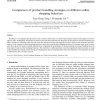Free Online Productivity Tools
i2Speak
i2Symbol
i2OCR
iTex2Img
iWeb2Print
iWeb2Shot
i2Type
iPdf2Split
iPdf2Merge
i2Bopomofo
i2Arabic
i2Style
i2Image
i2PDF
iLatex2Rtf
Sci2ools
ECRA
2006
2006
Comparison of product bundling strategies on different online shopping behaviors
Bundling is a very popular sales-promotion tool, in which a critical issue is to decide what products should be sold together in order to improve sales. Traditionally, this decision is based on the order data collected from the points of sale. However, Internet marketing now allows marketers to efficiently collect not only order data but also browsing and shopping-cart data, which provide marketers with information on the consumers' decision-making processes, rather than only the final shopping decisions. The present study aimed to determine the value of this newly available information by comparing the performance of decision-making on product bundling based on three types of data on online shopping behaviors. The results from a field experiment reveal that significantly better decisions are made on the bundling of products when browsing and shopping-cart data are integrated than when only order data or browsing data are used.
| Added | 12 Dec 2010 |
| Updated | 12 Dec 2010 |
| Type | Journal |
| Year | 2006 |
| Where | ECRA |
| Authors | Tzyy-Ching Yang, Hsiangchu Lai |
Comments (0)

